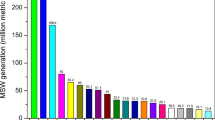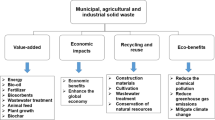Abstract
Purpose
The aim of this research was to determine the optimum way of recovering energy from the biodegradable fractions of municipal waste. A part-life cycle study was carried out on the following wastes: paper, food waste, garden waste, wood, non-recyclable mixed municipal waste and refuse-derived fuel. The energy recovery processes considered were incineration, gasification, combustion in dedicated plant, anaerobic digestion and combustion in a cement kiln.
Methods
The life cycle assessment (LCA) was carried out using WRATE, an LCA tool designed specifically for waste management studies. Additional information on waste composition, waste collection and the performance of the energy recovery processes was obtained from a number of UK-based sources. The results take account of the energy displaced by the waste to energy processes and also the benefits obtained by the associated recycling of digestates, metals and aggregates as appropriate.
Results and discussion
For all the waste types considered the maximum benefits in terms of climate change and non-renewable resource depletion would be achieved by using the waste in a cement kiln as a substitute fuel for coal. When considering the impacts in terms of human toxicity, aquatic ecotoxicity, acidification and eutrophication, direct combustion with energy recovery was the best option. The results were found to be highly sensitive to the efficiency of the energy recovery process and the conventional fuel displaced by the recovered energy.
Conclusions and recommendations
This study has demonstrated that LCA can be used to determine the benefits and burdens associated with recovering energy from municipal waste fractions. However, the findings were restricted by the lack of reliable data on the performance of waste gasification and anaerobic digestion systems and on the burdens arising from collecting the wastes. It is recommended that further work is carried out to address these data gaps.



Similar content being viewed by others
References
Banks CJ, Chesshire M, Heaven S, Arnold R (2011) Anaerobic digestion of source-segregated domestic food waste: performance assessment by mass and energy balance. Bioresour Technol 102(2):612–620
Bates J (2009) Impacts of managing residual municipal waste. In: Patel N (ed) Accomplishments from IEA bioenergy task 36: integrating energy recovery into solid waste management systems (2007–2009). International Energy Agency, Paris
Boldrin A, Neidwel TL, Damgaard A, Bhander GS, Møller J, Christensen TH (2011) Modelling of environmental impacts from biological treatment of organic municipal waste in EASEWASTE. Waste Manage 31:619–630
BS EN ISO 14040 (2006) Environmental management—life cycle assessment—principles and framework. British Standards Institution, London, UK
Burnley SJ, Phillips R, Coleman T, Rampling TWA (2011) Energy implications of managing the biodegradable fractions of municipal waste in the United Kingdom. Waste Manage 31(9–10):1949–1959
Carbon Trust (2008) Biomass heating a practical guide for potential users. The Carbon Trust, London
Consonni S, Giugliano M, Grosso M (2005) Alternative strategies for energy recovery from municipal solid waste part A: mass and energy balances. Waste Manage 25:123–135
Dahlbo H, Laukka J, Melanen M, Peltola S (2005) Waste management options for discarded newspaper in the Helsinki Metropolitan Area. Finnish Environment Institute, Helsinki
Department for Environment Food and Rural Affairs (Defra) (2011) Government review of waste policy in England 2011. Defra, London
Department of Energy and Climate Change (2012) Statistical release 2011 UK greenhouse gas emissions, provisional figures and 2010 UK greenhouse gas emissions, final figures by fuel type and end-user. DECC, London. http://www.decc.gov.uk/assets/decc/11/stats/climate-change/4817-2011-uk-greenhouse-gas-emissions-provisional-figur.pdf (Accessed 13 April 2012)
Department of the Environment (1994) National household waste analysis project phase 2, volume 3: chemical analysis data. Environment Agency report CWM 086/94, Department of the Environment, London, UK
Environment Agency (2010) Waste and Resources Assessment Tool for the Environment (WRATE), The Environment Agency for England and Wales, Bristol, UK. http://www.environment-agency.gov.uk/research/commercial/102922.aspx, (Accessed 13 April 2012)
European Commission (1994) Directive on packaging and packaging waste. Official Journal of the European Communities L365, 31/12/1994:10–23, Brussels, Belgium
European Commission (2003) Refuse derived fuel, current practice and perspectives, B4-3040/2000/306517/MAR/E3. European Commission, Brussels
European Commission (2008) Directive on waste and repealing certain directives, Official Journal of the European Communities L312, 22/11/2008:3–30, Brussels, Belgium
Fock F, Thomsen KPB, Houbak N, Henriksen U (2000) Modelling a biomass gasification system by means of “EES”. Scandinavian Simulation Society Conference, Technical University of Denmark, Lyngby
Frischknecht R, Jungbluth N, Althaus H-J, Doka G, Dones R, Heck T, Hellweg S, Hischier R, Nemecek T, Rebitzer G, Spielmann M (2005) The ecoinvent database: overview and methodological framework. Int J Life Cycle Assess 10(1):3–9
Godley AR, Graham A, Lewin K (2009) Estimating biodegradable municipal waste diversion from landfill: screening exercise to evaluate the performance of biodegradable waste test methods. Report P1 5–13, Department for Environment, Food and Rural Affairs, London, UK
Guinée JB (ed) (2002) Handbook on life cycle assessment. Kluwer Academic Publishers, Dordrecht
Kärnä A, Engstrőm J, Kutinlahti T, Pajula T (1994) Life cycle analysis of newsprint: European scenarios. Pap Puu–Pap Tim 76(4):232–237
Kranet M, Gottschall R, Bruns C, Hafner G (2010) Energy or compost from green wastes—a CO2-based assessment. Waste Manage 30(4):697–701
McDougall F, White P, Franke M, Hindle P (2001) Integrated solid waste management: a life cycle inventory, 2nd edn. Blackwell, Oxford
Michaud J-C, Farrant L, Jan O (2010) Environmental benefits of recycling—2010 update. Waste and Resources Action Programme, Banbury
Watson M, Hoy C, Mkushi G, Williams M (2009) Modelling of impacts for selected residual waste plant options using WRATE. AEA Technology report ED46665, AEA Technology, Harwell, UK
Acknowledgements
We are pleased to acknowledge the assistance of the waste management companies, local authorities and individuals who provided data for this research. We would also like to thank the Environment Agency and the Department for Environment, Food and Rural Affairs (Defra) for funding this research. However, the views expressed are those of the authors alone and not necessarily those of either of these organisations.
Much of Dr. Burnley’s contribution to this research was carried out while on secondment to the Environment Agency funded by the UK Royal Academy of Engineering’s (RAEng) Industrial Secondment Scheme. This source of funding is gratefully acknowledged.
Author information
Authors and Affiliations
Corresponding author
Additional information
Responsible editor: Shabbir Gheewala
Rights and permissions
About this article
Cite this article
Burnley, S., Phillips, R. & Coleman, T. Carbon and life cycle implications of thermal recovery from the organic fractions of municipal waste. Int J Life Cycle Assess 17, 1015–1027 (2012). https://doi.org/10.1007/s11367-012-0438-3
Received:
Accepted:
Published:
Issue Date:
DOI: https://doi.org/10.1007/s11367-012-0438-3




